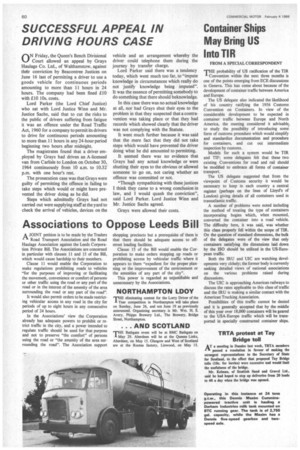SUCCESSFUL APPEAL IN DRIVING HOURS CASE
Page 62

If you've noticed an error in this article please click here to report it so we can fix it.
ON Friday, the Queen's Bench Divisional Court allowed an appeal by Grays Haulage Co. Ltd., of Walthamstow, against their conviction by 13eacontree Justices on June 16 last of permitting a driver to use a goods vehicle for continuous periods amounting to more than 11 hours in 24 hours. The company had been fined £10 with £10 10s. costs.
Lord Parker (the Lord Chief Justice) who sat with Lord Justice Winn and Mr. Justice Sachs, said that to cut the risks to the public of drivers suffering from fatigue it was an offence under the Road Traffic Act, 1960 for a company to permit its drivers to drive for continuous periods amounting to more than 11 hours in any 24-hour period beginning two hours after midnight.
The magistrates found that a driver employed by Grays had driven an A-licensed van from Carlisle to London on October 30, 1964 continuously from 10 a.m. to 10.32' p.m. with one hour's rest.
The prosecution case was that Grays were guilty of permitting the offence in failing to take steps which would or might have prevented the driver doing as he did.
Steps which admittedly Grays had not carried out were supplying staff at the yard to check the arrival of vehicles, devices on the vehicle and an arrangement whereby the driver could telephone them during the journey by transfer charge.
Lord Parker said there was a tendency today, which went much too far, to "impute knowledge in circumstances which really do not justify knowledge being imputed". It was the essence of permitting somebody to do something that there should beknowledge.
In this case there was no actual knowledge at all, nor had Grays shut their eyes to the problem in that they suspected that a contravention was taking place or that they had records which showed clearly that the driver was not complying with the Statute.
It went much further because it was said that the mere fact that they did not take steps which would have prevented the driver doing what he did amounted to permitting.
It seemed there was no evidence that Grays had any actual knowledge or were shutting their eyes to the obvious or allowed someone to go on, not caring whether an offence was committed or not.
"Though sympathizing with these justices I think they came to a wrong conclusion in law, and I would quash the conviction", said Lord Parker. Lord Justice Winn and Mr. Justice Sachs agreed.
Grays were allowed their costs.




































































































































































































